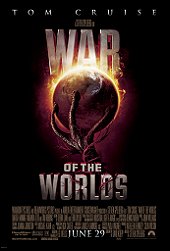Yet another adaptation of H.G. Wells' oft-visited alien invasion novel, Steven Spielberg's War of the Worlds is an outstanding summer blockbuster which delivers proverbial special effects sequences as well as emotional weight. It may seem like a shameless money-grab to use Wells' revered novel as fodder for a big-budget action-adventure, but with present-day concerns about war and terrorism, it was an ideal time to reinvent the story for modern film-goers. Thankfully, with master filmmaker Steven Spielberg at the helm, this science-fiction blockbuster easily transcends the usual standard for summer action pictures in terms of characterisation, visual craftsmanship and thematic substance. 2005's War of the Worlds is anything but ordinary or forgettable, and it stands the test of time.

For this version of War of the Worlds, screenwriters David Koepp and Josh Friedman relocate Wells' story to New Jersey in the 21st Century. The protagonist here is divorced, blue-collar working father Ray Ferrier (Tom Cruise), who receives his kids Rachel (Dakota Fanning) and Robbie (Justin Chatwin) for the weekend while his ex-wife (Miranda Otto) heads to Boston for a weekend getaway. Ray's relationship with his children is severely strained, and his inherent parental deficiencies are instantly apparent, but it isn't long before violent lightning storms assault the neighbourhood. The residents are initially intrigued by the oddball weather...until giant alien tripods rise from the ground, and summarily obliterate everything in their path. Faced with a full-scale alien attack, and the possibility of humanity's extermination, Ray and his kids go on the run, journeying around the East Coast looking for shelter and safety in a desperate bid for survival.
Spielberg used to be optimistic about extraterrestrials, with Close Encounters of the Third Kind and E.T.: The Extra Terrestrial reinforcing harmonious messages about intergalactic travellers. For War of the Worlds, though, the filmmaker gives aliens the same type of menace he applied to Jurassic Park's dinosaurs and the shark in Jaws. These otherworldly beings do not come to Earth to make peaceful contact, but instead to exterminate humankind and colonise the planet. Once the attack begins, War of the Worlds briskly moves from one phenomenal action set-piece to the next, though the in-between material is also effective. Amid the violence, Spielberg and the writers exhibit higher ambitions, finding time for incisive societal commentary. Indeed, the film highlights how grim circumstances can bring out the best and worst of human nature, with nasty instances of mob mentality and selfishness more often than moments of selfless bravery. With Spielberg framing this story from the point-of-view of a small family, War of the Worlds possesses a jarring, horrifying immediacy, making the fight to survive feel profoundly real.

Plenty of noteworthy action set-pieces take the breath away throughout War of the Worlds. For example, the intersection sequence which spotlights the tripods' first appearance is horrifying and riveting; executed with astute immediacy that places you in the midst of a nightmare coming true. Even better is the perfectly-realised sequence depicting Ray and the kids leaving their house as tripods obliterate the area. The digital effects work bringing the tripods to life is first-rate and often seamless (the film received a Best Visual Effects Oscar nomination), while the cinematography by Spielberg's frequent collaborator Janusz Kaminski vividly captures the invasion. War of the Worlds is full of striking imagery, from long shots studying the destruction, to eye-level shots of the tripods chillingly obscured by smoke. The tripods' distinctive roar is unnerving, too, and John Williams' reliably bravura score generates immense trepidation during the big and small moments. From a technical viewpoint, War of the Worlds is quite simply impossible to fault. Even though filming began a mere seven months before its world premiere, it does not display the earmarks of a slapdash rush-job.
Even though War of the Worlds is a spectacular blockbuster, it is also traumatic and harrowing, with images of violence and destruction carrying devastating emotional weight. In addition to the striking shots of widespread devastation, the eerily quiet moments hit hard as well, such as a river choked with lifeless bodies. There are visual references to 9/11 as well, which enhances the movie's impact and relevance. However, the film's ending is a letdown, with the alien defeat seeming too quick and easy. Consequently, War of the Worlds feels like two borderline perfect initial acts followed by a truncated, almost non-existent third act. The method of defeat is acceptable (and true to the book), but it feels underdone and out of the blue. Not to mention, the closing scenes are generically Hollywood and feel-good, as if a studio committee decided upon this material to lighten Spielberg's otherwise bleak vision. A few Hollywood stupidities also blemish War of the Worlds - a video camera perfectly operates after an EMP hit, for instance, and Ray's van is completely unaffected after a massive storm in which a commercial airliner crashes right next to them. Rewrites could have easily ironed out these flaws.

By keeping the story first-person, Spielberg's vision of this alien invasion is uniquely personal and immediate. Additionally, a welcome sense of humour alleviates the otherwise pervasive sense of dread and make the characters feel more human. It also helps that Spielberg retains the book's ultimate dénoûment, in turn delivering an effective message about the importance of the Earth's multilayered ecosystem. Plus, through advancements to human evolution and scientific breakthroughs over thousands of years, humankind has earned the right to share this planet with billions of complex organisms. This thoughtfulness adds a bit more weight and meaning to the story beyond pure, hollow pyrotechnics. Spielberg does not skimp on the special effects since they are the film's bread and butter, but it's the underlying sense of gravitas which elevates this above Transformers or Independence Day.
8.2/10
 Login
Login